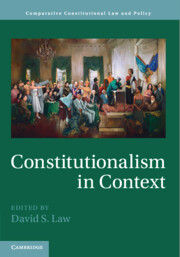Book contents
- Reviews
- Constitutionalism in Context
- Comparative Constitutional Law and Policy
- Constitutionalism in Context
- Copyright page
- Dedication
- Contents by Topic
- Contents by Region
- Figures
- Tables
- Contributors
- User’s Guide and Preface
- Abbreviations
- I Introduction to the Field
- II Concepts and Definitions
- III Constitutional Drafting and Revision
- 5 Constitution-Making for Divided Societies: Afghanistan
- 6 Constitutional History and Constitutional Migration: Nepal
- 7 Constitutional Transformation: Hungary
- 8 International Law and Constitution-Making: Sudan
- IV Constitutional Adjudication and Interpretation
- V Rights
- VI Structure
- VII Challenges to Liberal Democratic Constitutionalism
- Index
- References
6 - Constitutional History and Constitutional Migration: Nepal
from III - Constitutional Drafting and Revision
Published online by Cambridge University Press: 17 February 2022
- Reviews
- Constitutionalism in Context
- Comparative Constitutional Law and Policy
- Constitutionalism in Context
- Copyright page
- Dedication
- Contents by Topic
- Contents by Region
- Figures
- Tables
- Contributors
- User’s Guide and Preface
- Abbreviations
- I Introduction to the Field
- II Concepts and Definitions
- III Constitutional Drafting and Revision
- 5 Constitution-Making for Divided Societies: Afghanistan
- 6 Constitutional History and Constitutional Migration: Nepal
- 7 Constitutional Transformation: Hungary
- 8 International Law and Constitution-Making: Sudan
- IV Constitutional Adjudication and Interpretation
- V Rights
- VI Structure
- VII Challenges to Liberal Democratic Constitutionalism
- Index
- References
Summary
This chapter examines the contested concept of constitutional identity in the comparative constitutional law literature and situates it in the specific jurisdictional context of Nepal. In particular, the analysis concentrates on the foundational function of constitutions and explores the relationship between constitutionalism, identity politics, and constitutional design. Nepal is an ideal case study for exploring the notion of constitutional identity because it sits uneasily within the traditional taxonomies used in the discipline. For instance, Nepal is the only South Asian country that was never colonised and whose legal system does not operate in English, but in the country’s national language, Nepali. This unusual level of historical continuity in the process of nation-building has complicated the construction of constitutional identity, as demonstrated by the embattled historical relationship between the Shah-centered “national monarchy” and democracy, the enduring and controversial position of Hinduism in the constitutional framework, and the patterns of legal discrimination on the basis of identity that persist in the new 2015 constitution.
Keywords
- Type
- Chapter
- Information
- Constitutionalism in Context , pp. 113 - 135Publisher: Cambridge University PressPrint publication year: 2022

